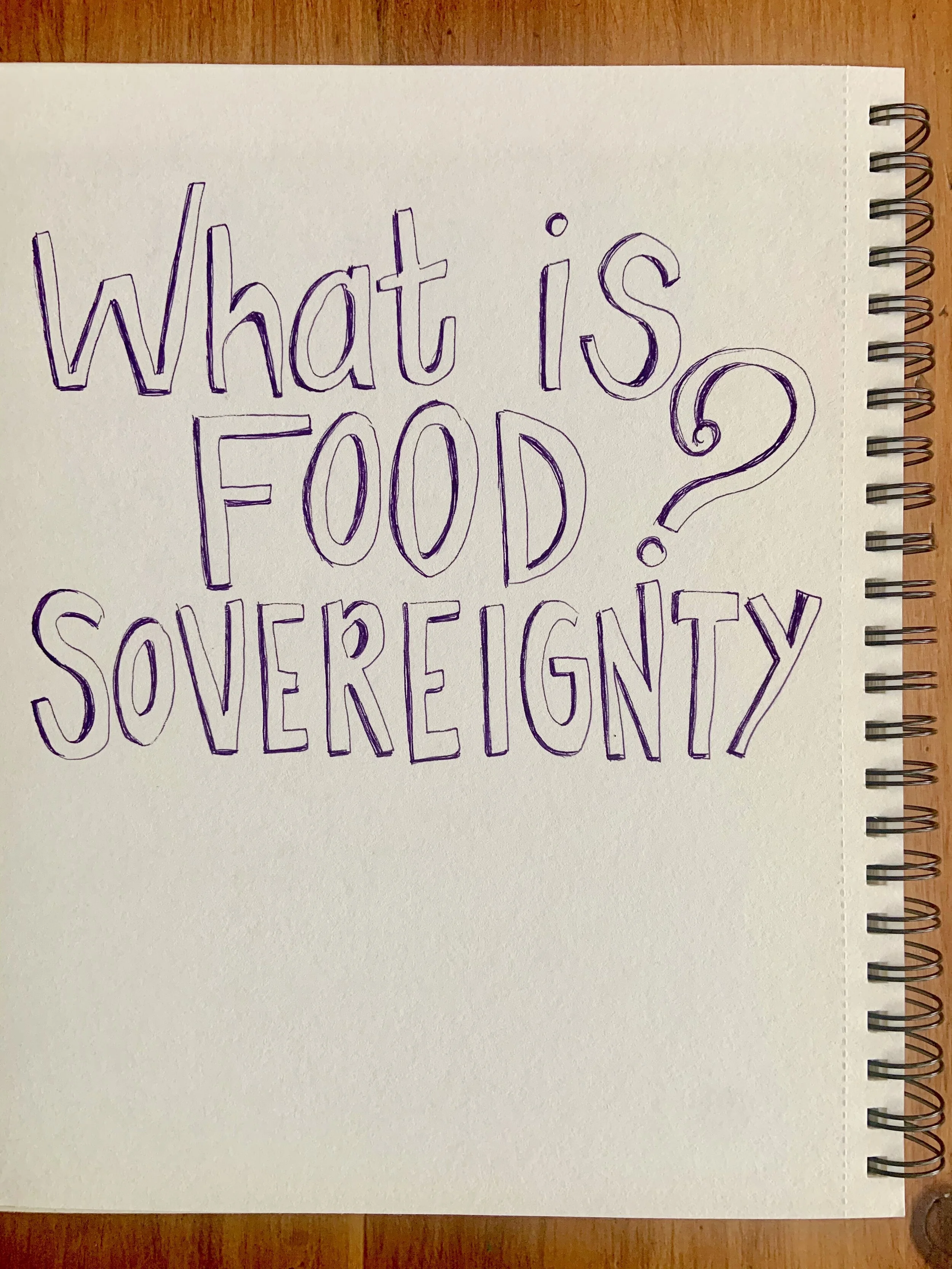Here at the Kearsarge Food Hub, our mission is to reinvigorate our community within a restorative local food system through cultivating food sovereignty, growing engaged learners, and nurturing community. This mission is a new iteration of what we’ve been working toward over the past five years, with the notable addition of the term food sovereignty.
Amidst the wave of learning and unlearning that is currently sweeping our society, we have come to understand that the term food insecurity - a term we often use to describe the state of not knowing from where or when your next meal is coming - is inadequate. While we certainly do wish to contribute to food security for all members of our community, there is a deeper layer to work on, namely to empower each and every person to have control over their food, and the systems that cultivate it.
An exploration into food sovereignty is also an exploration into racial justice. In the conventional food system, Black, Indigenous, and People of Color (BIPOC) communities have been systematically denied the right to design and carry out their food systems in their own interests, while being disproportionately burdened with the labors of the food system at large.
We have a lot to learn in the realm of food sovereignty, and there are many folks and organizations who have been steeped in this work whom we turn to for leadership. In an effort to bring our community along this learning journey, we thought we would take this opportunity to introduce food sovereignty, if this idea is new to you, and highlight the voices that are leading this work.
What is Food Sovereignty?
“Food sovereignty is the right of peoples to healthy and culturally appropriate food produced through ecologically sound and sustainable methods, and their right to define their own food and agriculture systems. It puts the aspirations and needs of those who produce, distribute and consume food at the heart of food systems and policies rather than the demands of markets and corporations.”
-- Declaration of Nyéléni, the first global forum on food sovereignty, Mali, 2007.
There is an incredible inequity in the way that BIPOC (Black, Indigenous, People of Color) communities have labored and been exploited in creating and sustaining the food system, and the success and profitability that White owners of agricultural corporations experience. Leah Penniman, author of Farming While Black and co-founder of Soul Fire Farm - a BIPOC-centered community farm committed to ending racism and injustice in the food system- comments in an interview with Zora, that “we can’t actually talk about farming and food without race. Farmers, as in landowning farm managers, are the Whitest profession in the United States, and being a farmworker is the Brownest profession in the United States.”
There is deeply traumatic history of genocide and displacement of Indigenous communities, suppression and eradication of traditional knowledge and cultural practices, and enslavement of Black people for forced agricultural labor that speak to this inequity. Yet this isn’t just a thing of the past. The current agro-industrial system relies on the exploited labor of people of color, land access inequities, and wealth disparities that favor White-owned ventures.
Despite the foundational role that BIPOC have played and continue to play in the functioning of such a large system, these communities reap few benefits and face a disproportionate amount of poverty. Years of inequitable labor, governmental land grabs, gentrification, oppression of cultural heritage, mass incarceration, and other prongs of systemic racism have prevented BIPOC communities from access to healthy and culturally appropriate food. As a product of colonization, BIPOC have systematically been prevented from gaining the economic and physical resources and autonomy necessary to cultivate food and foodways that are in line with their cultural heritage and health and healing for their communities.
This is where Food Sovereignty and organizations working toward it come into play.
Food sovereignty represents control and consensus, where a community exercises its right to have agency over their own food systems. This opens the door to a revival of traditional food ways and to engage in a collective healing, where the voices of those who have historically been oppressed are able to rise to the surface and advocate for culturally appropriate food and food systems. Food sovereignty is a way for communities to heal from generational trauma, revitalize cultural heritage that has been suppressed through centuries of white supremacy, and gain economic self-determination that they have historically been denied.
Who is currently working toward food sovereignty and how you can support them:
We believe every community should have a clear pathway to food sovereignty. Digging deeper into this work has rightfully prompted a lot of discussion within our organization about systemic inequities, both in our community and beyond. As a part of this we are stepping into the responsibility of recognizing whose voice isn’t currently represented in our work, and examining how we can better serve all members of the community.
To be honest, our journey represents that of many White-operated businesses and organizations who are beginning to work toward addressing these issues. While KFH is new to approaching the work on an intentional, organizational level, there are many who have and continue to lead the conversation. As part of engaging in this work to create more equitable food systems, it is imperative we uplift their work and recognize how we benefit from their leadership.
The Somali Bantu Community Association in Maine
Since 2005 The Somali Bantu Community Association’s mission has been “to provide vital transitional services, advocacy, and programming that empowers members of the refugee community to uphold cultural identity and thrive in their new life here in Lewiston, Maine.” -- Somali Bantu Community Association
Liberation Farms, a community farming program of the SBCA, exists with the goal of providing “new American families struggling with food insecurity with the tools and resources to grow healthy, culturally-appropriate foods for themselves and their community. This investment in growing nourishes body and soul as farmers ground into familiar traditions and meaningfully utilize their agricultural roots as they build new homes here in Maine.” --SBCA webpage
Over the past summer, the SBCA raised the necessary funds to secure farmland in Maine. “The Agrarian Commons holds land in perpetuity, protected against future development, and conveys equitable, renewable leases to farmers and communities for 99+ renewable years.” This was a massive step toward food sovereignty, however the work continues and the members of the SBCA continue to work tirelessly toward their goals. You can read more about the SBCA and Liberation Farms here on their website.
The Susu Healing Collective in Brattleboro Vermont:
“The SUSU Healing Collective's mission is to offer an affirming space for people to practice community reciprocity; The act of giving from a place of abundance and receiving from a place of deep love and reverence while learning how to engage in community practices that dismantle systems of oppression and build systems of health, healing, wellness, and magic. The SUSU centers the voices, healing, and experiences of Black, Indigenous, People of Color and is committed to creating safer spaces for people to release trauma patterns of white supremacy, oppression, colonization, and westernized disconnection.” -- this and more can be found on the Susu Healing Collective website.
Much like the SBCA, the incredible work of those at and in community with the SUSU Healing Collective’s has resulted in tangible successes. This past year they raised $20k to purchase CSA shares for 26 for BIPOC families in Brattleboro, and they look forward to continuing the work toward liberation in Vermont with goals of purchasing land to be held in perpetuity for the BIPOC community of Vermont. They continue to work toward their goal of “offering affirming spaces for Black, Indigenous, People of Color to thrive and experience safety while healing from the intergenerational trauma of systemic oppression” and build a multiracial commUNITY with sustainable relationships founded on reciprocity (read more about their mission and work here). Part of this healing process would be the creation of the SUSU commUNITY Farm, a Black and Indigenous stewarded farm in Southern Vermont. You can learn more about the SUSU Healing Collective’s work, mission, and future goals toward food sovereignty by following this link to their new fundraising page where they can now accept tax deductible donations to aid them in their work.
Fresh Start Farms in Manchester, New Hampshire:
Fresh Start Farms is a branch of the Organization of Refugee and Immigrant Success (ORIS), headquartered in Manchester, New Hampshire. ORIS is a nonprofit with the mission to “aid in the resettlement of refugees and immigrants in New Hampshire by providing assistance, training, resources, and opportunities that promote self-sufficiency.” (Mission Statement on ORIS webpage). Fresh Start Farms contributes to that mission with a goal of promoting land tenure and equity for New American farmers, wherein immigrant and refugee farmers can provide culturally appropriate foods for their communities as well as economically support themselves.
Kearsarge Food Hub is partnering with Fresh Start Farms to aggregate goods on their behalf and build a collaborative NH Food Hub network, alongside other statewide partners.
Food Sovereignty in Our Community
All of the organizations mentioned in the above section have been working tirelessly toward food sovereignty in their communities. We are in a position to learn from their work and intentionally incorporate what we have learned into our organization going forward while making sure to credit, support, and repay the folks who live this work. As we go forward we want to continue uplifting the voices of those people and organizations while also working to address issues of food sovereignty in our community, through the work we do and networks we have.
This means doing things like redesigning our mission statement to promote food sovereignty over food security. It also means connecting with our community to promote education and discussion around decolonizing efforts like food security, like we hope to do with this post and an upcoming screening of the film Gather (a documentary about the growing movement among indigenous communities to reclaim their spiritual, cultural, and political identities through food sovereignty which you can register for right here!).
This conversation is only the beginning. We have work that we will continue to do, and much more to learn. However, what we hope this post has done is provide an avenue for you to learn about food sovereignty if you were previously unfamiliar, and showcase organizations that have been committed to this work in our community. We strive to join them in this work, and hope that you will likewise join us as we continue to work toward food sovereignty in the Kearsarge area.
Written by Cameron Huftalen
Edited by Hanna Flanders

